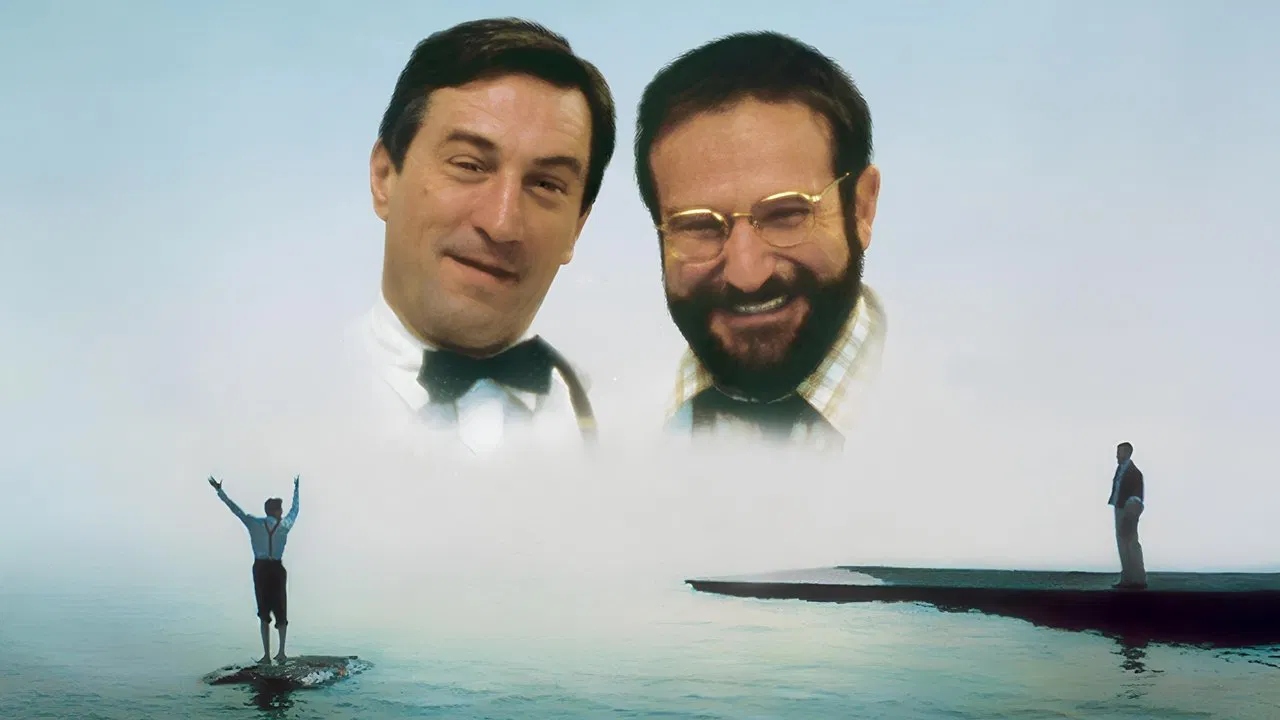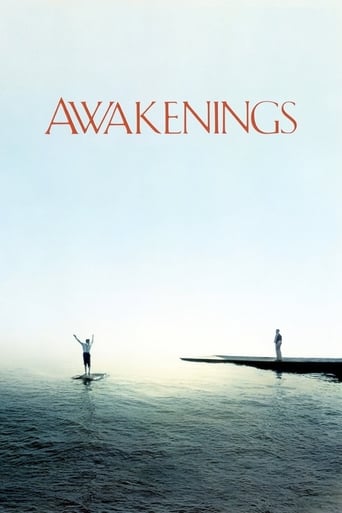

Awakenings, based closely on the nonfiction book of the same name by Oliver Sacks, will move, then open, then break your heart. In playing against type, DeNiro and Williams deliver incredibly layered performances as they explore, without being maudlin or sentimental what it means to be human, to be alive, to be a brain in a body. After I saw this movie for the first time I could barely sleep, it nearly triggered a depressive episode but I've actually gone back to it multiple times and read the source material because it's such a fascinating and important, albeit anguishing, story. Awakenings will stay with you, and I can't recommend it enough.
... View MoreRobert De Niro and Robin Williams both play against type in this engaging story of a doctor who makes a connection between childhood encephalitis and a disease that leaves it's patients in a virtual catatonic state well into adulthood. One of the more extreme cases is that of Leonard Lowe (De Niro), who has been non-responsive for over thirty years. Dr. Malcolm Sayer (Williams) initially seems out of his element in a position that requires a deft touch with human beings, as his previous work in research was more suited to his introverted personality. But his perseverance in learning about his patients and their medical histories prepares him to do some head-butting with the administrative staff of Bainbridge Hospital in order to provide funding for a drug he believes will help.At this point in his career, Robin Williams was skillfully taking on more dramatic roles compared to the inspired lunacy that pervaded his earlier work. In a different time and place, he might have portrayed the role of Leonard, with De Niro assuming the role of the doctor. The eclectic casting makes for a surprisingly effective and heartwarming drama, though the feeling becomes muted as the story progresses, with Leonard regressing back into a pattern of tics and spasms that takes it's toll on his self worth. Apparently the effect of the drug seemed to lose it's effectiveness over time, as other patients exposed to the treatment began questioning their own likelihood for relapse.Based on a true story, and realizing the need for a compact narrative, it did seem too coincidental that many of the patients similar to Leonard all responded miraculously to the drug treatment and began functioning more normally again almost instantly. The film's afterword mentioned that the success rate of the real doctor who developed the curative drug never again achieved that of the time frame depicted in the story during the summer of 1969. But for a brief moment in time, the picture evokes the power of the human spirit to overcome the intricate frailties of the human body.
... View MoreWhen the film career of Robin Williams is in question, there are two bodies of work to be discussed: His comedy (stand-up, Mrs. Doubtfire, Good Morning Vietnam, etc.) and his serious roles (Good Will Hunting, Dead Poets Society, One Hour Photo, etc.). However, there is one film that seems to slip under the radar a bit (I had never heard of it until a friend "dug it up"), and that is a shame...as "Awakenings" is a movie that will touch your spirit.The basic plot of the film (based on the true story of the life experiences of Dr. Oliver Sacks) sees Dr. Malcolm Sayer (Williams) assigned to the neurotic ward of a mental institution, where he quickly becomes fascinated with encephalitis patients, who are literally frozen in stature and have been that way for decades. All but given up on by clinical & clerical hospital staff, Sayer instead pushes the envelope with a radical new drug therapy program that allows him to revive nearly all of the catatonic patients. One of the "awakened" in particular, named Leonard Lowe (Robert De Niro), begins to actually live a normal life, only to see that existence thrown into doubt once again when the long-term effects of the drug treatment begin to take hold.In terms of plot, this one will really suck you in and have you rooting for the protagonists all the way through. Director Penny Marshall does a remarkable job of creating characters that you will truly feel for, and thus any setback is a huge emotional blow. For the more "emotionally inclined" viewers, certain moments will have you cheering out loud, while others will leave you completely devastated.The acting in "Awakenings" is also top-notch, as Williams plays the mousy (yet fantastically drive) Dr. Sayer with aplomb, while De Niro turns in a performance unlike any previous or since as the awakened patient who must learn to live in a world that has passed him by for so many years. The auxiliary "nuthouse" cast (think "One Flew Over The Cuckoo's Nest") also provide more humor and sincerity to the proceedings.Thus, if you have stumbled across this movie while perusing a film index or trolling through IMDb, don't let the anonymity fool you, as it is well worth your time.
... View MoreGreetings from Lithuania."Awakenings" (1990) is very moving, very involving and superbly crafted picture. Loosely based on a real story, it tells a powerful one, very simple yet very moving story - miracle if you ask me.Performances are first rate here from the great Robert De Niro and very good one from Robin Williams. Directing is superb - at running time ~2 hours this movie never drags and is highly involving from start till finish. Script by the great Steven Zaillian is also superb, not overwritten, not to much sentimental. Overall, "Awakenings" is a movie which after seeing it once you will probably won't ever forget it. This is a drama without any action, but it is done so good that its hard to stop watching it and admire. Great movie all around.
... View More